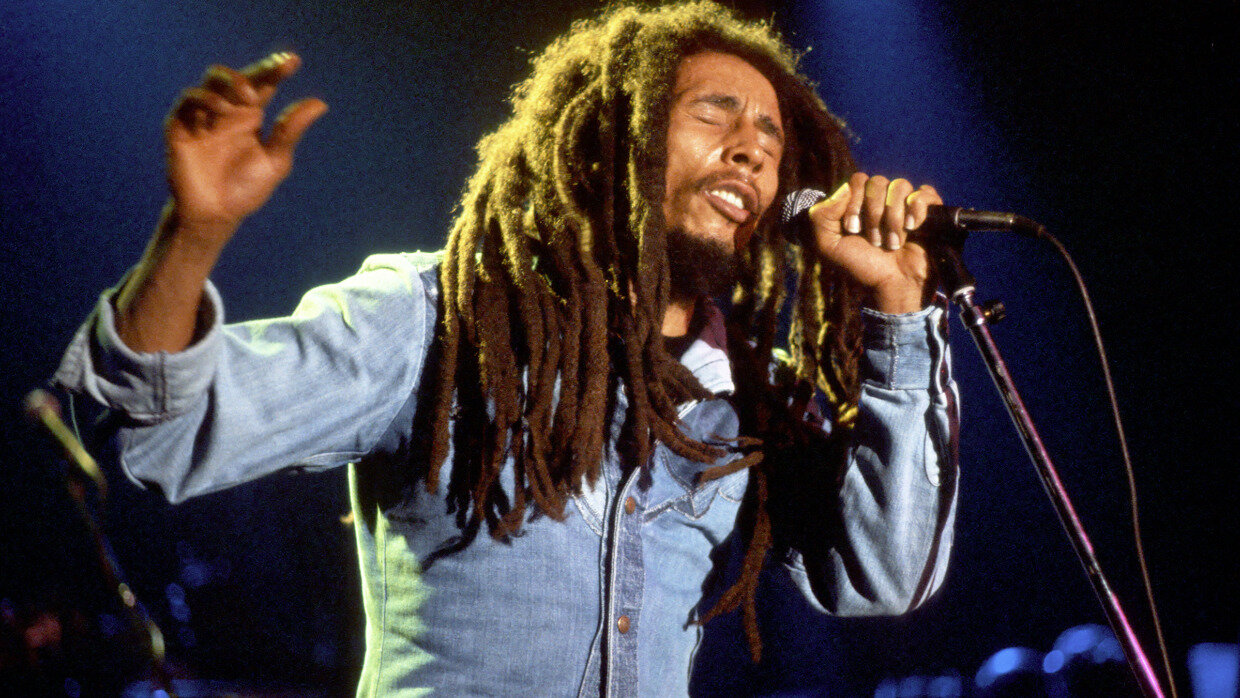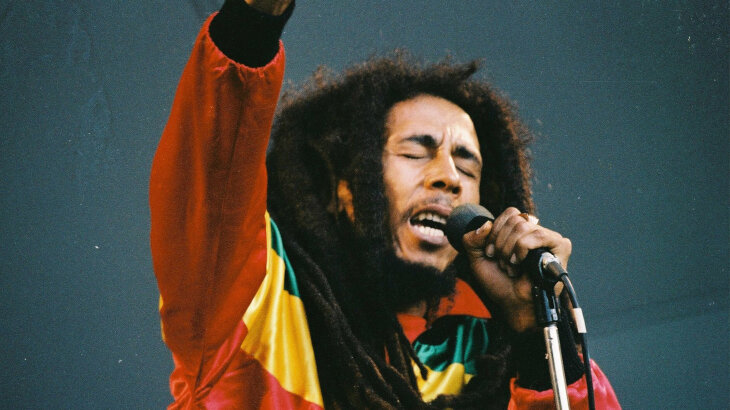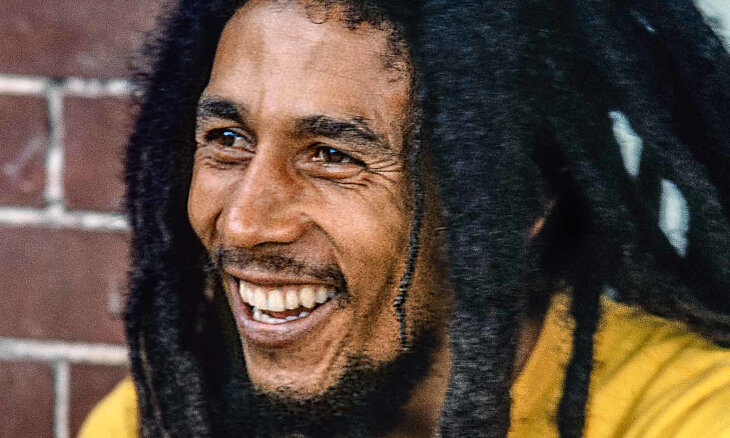 Iran’s Attack on Israel
Iran’s Attack on Israel


5 min read
The music legend wrote some of the most unabashedly religious and spiritual lyrics the rock world ever heard.
The new film Bob Marley: One Love has put me in the headspace to revisit the music and lyrics of one of the 20th century’s unique and celebrated artists. Marley pioneered a blend of Caribbean music, including Calypso and Ska, fused with American Jazz and R&B into his own distinct version of Reggae, elevating the profile of Jamaican music to the world stage. He was inducted into the Rock and Roll Hall of Fame and ranked 11th place on Rolling Stone’s list of the 100 Greatest Artists of All Time. And he did it while penning some of the most unabashedly religious and spiritual lyrics the rock world ever heard.
Though he was raised Catholic, Marley converted to Rastafarianism in his early 20s. This monotheistic religion—a blend of Judeo-Christian theology and an Ethiopian-rooted black nationalism—had a major impact on Marley and his music. Rastafarianism’s core principles, symbology, and aspirations are largely in sync with Jewish ones, though it does reframe them in its own image. In this regard, Ethiopia is regarded as “The Promised Land,” and the diaspora is called “Babylon.” But the concept is similar – there is a place (or a state of being) that is negative that you must struggle to overcome so that you can be redeemed and bask in the joy of personal and collective salvation. Marley was very focused on freedom.

Like the Biblical Exodus, one aspect of freedom is the simple act of leaving an oppressive place and entering a better one. But that’s just the start. It’s hard to shake the slave mentality. Like slaves, some prisoners grow so accustomed to prison life that they can’t survive on the outside. Describing an ex-con named Brooks Hatlen who had committed suicide after his parole, Morgan Freeman’s character in The Shawshank Redemption explained, “He's just institutionalized. The man's been in here 50 years. 50 years! This is all he knows. In here, he's an important man. He's an educated man. Outside, he's nothing. Just a used-up con with arthritis in both hands. Probably couldn't get a library card if he tried.”
Marley’s fixation with redemption found its fullest flower in Exodus, a song that UDiscoverMusic described as "a rippling, surging, seven-minute call to arms for a nation of displaced souls on the march to a new spiritual homeland. Marley sang against a cyclical riff that was turned, like clay on a potter's wheel, to perfection." He sang:
Open your eyes (And look within)
Are you satisfied? (With the life you're livin'?)
We know where we're goin'
We know where we're from
We're leavin' Babylon
We're goin' to our Fatherland
The goal of emancipation is clear, but the stumbling blocks along the road to it are numerous. As the Hebrew slaves found out all too well, the Promised Land is not so easy to reach, and the bravery required to take that first step out of your cell is only the beginning of a much longer journey. Like Brooks Hatlen, they also couldn’t shake aspects of their former lives and had to struggle to reach a new way of thinking and being. Thankfully, most of us are unfamiliar with physical servitude. Sadly, we are highly familiar with its other forms.

According to Jewish thought, there are four kinds of slavery—physical, emotional, mental, and spiritual (each one of these is represented by one of the four cups of wine we drink on Passover). Even if you’re not chained to a cinderblock wall, you may be bound in a variety of other ways. Can you control your emotions? At times it may feel as if some other force compels you to be angry, depressed, or anxious. Isn’t that a kind of enslavement? How many of you are unable to even consider political views that are unlike the group you associate with? Are these realities truly a function of “free” will, or are you so steeped in conformity that you can’t begin to perceive how chained down you really are?
 Marley’s face on a piece of matzah, a symbol of freedom
Marley’s face on a piece of matzah, a symbol of freedom
In 1979, Marley was diagnosed with the melanoma that took his life a couple of years later. According to his wife Rita, "He was already secretly in a lot of pain and dealt with his own mortality.” His introspective state was apparent in his classic 1980 album Uprising, and nowhere was it more pronounced than in Redemption Song. Accompanying himself on guitar, Redemption Song was unlike anything he had ever recorded: an acoustic ballad without any hint of reggae rhythm. Its message and sound seemed more Bob Dylan than Bob Marley. Biographer Timothy White called it an “acoustic spiritual,” and another biographer, Stephen Davis, pointed out the song was a “total departure,” a deeply personal verse sung to the bright-sounding acoustic strumming of Marley’s Ovation Adamas guitar. He sang:
Emancipate yourselves from mental slavery
None but ourselves can free our minds.Won't you help to sing
These songs of freedom?
As Goethe wrote, “None are more hopelessly enslaved than those who falsely believe they are free.” The price of true freedom is enormous courage, an ardent open-mindedness, and a dogged willingness to explore the less savory aspects of your inner worlds. From the Hebrew Prophets to the Enlightenment poets to a Reggae musician from the 70s who died too young, many have exhorted you to smash your chains and be free. Few take up the hammer, but it sits there, patiently waiting for all who want it.

It would have been nice to get a reference for the statement:
"According to Jewish thought, there are four kinds of slavery—physical, emotional, mental, and spiritual"
I know Jah is a poetic or shortened version of the four lettered name of HaShem. Since Rasta people use the term Jah Jah for Halie Salasie should we not use Jah Jah?
very nice thanks!
Rabbi Jacob's topics, writing style and unique insights are great! Keep them articles coming!
Bob Marley’s music kinda makes me think of the Maccabeats: secular music with a biblical twist. 😊 Baruch HaShem!!!
I’m so blessed to see this article about Bob Marley today. It truly is amazing how HaShem works through people, historically, to bring His message and show how His Holy Word applies to our own lives. Yes, there really isn’t true freedom in the sin of worldliness; as it’s our God’s wisdom and truth that truly frees us. Thank you for appreciating the light within Bob Marley; even if Rastafarianism is a bit different than our own beliefs - our God has made all things work together somehow for the goodness of being able to share the awesomeness of our God and His perfect Way with the rest of the world. Thank you for seeing past our religious differences and instead honoring, valuing, and sharing our religious/spiritual commonalities instead. Baruch HaShem!!!
Songwriters, accomplished musicians, may function culturally as prophets. Four of the 20th century CE outstanding songwriters/musicians/prophets are Bob Marley, Bob Dylan, Leonard Cohen, and Paul Simon.
He did make classic music but he also gave people around the world an excuse for smoking weed all day and being in the business and then they conned voters by saying it cured or prevents cancer......ask Bob about that or 100 or more famous Jamaicans that also believed that and died young from cancer and heart disease.
He was close to his Jewish grandfather, on his father's side.
Elvis Presley is Aaron , mother is a Jew.